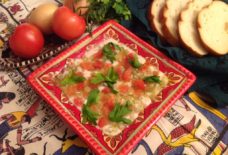Noor Al-Jeylaani: Pioneering Sudanese Music and Identity
By Evan Ploeckelman / Arab America Contributing Writer
Noor al-Jeylaani is one of the foremost musicians of Sudan, popular even to this day. Many Sudanese musicians are not very popular around the world for a variety of reasons, including the over-prevalence of Arabic singing musicians from other countries in the Arab World like Egypt, the numerous languages used in Sudan, and the economic condition of Sudan itself. While there are many other outstanding Sudanese musicians besides Al-Jeylaani, focusing on him shows, beyond his own accomplishments, the general style and achievements of Sudanese music.
Biography
Al-Jeylaani was born in the village of Abu Haleema, just outside of Bahri, or Khartoum North. He began his singing career in the 1970’s in a group called Sallat As-Sa’alik (سلة الصعاليك), or “Gang of Thugs.” He quickly rose to stardom due to his unique style and voice. Many critics at the time had difficulty categorizing Al-Jeylaani’s music. With influences from Sudan, Arab, and African music, along with his own personal style, his music never ceased to confound, but also delight, listeners.
Discography
Many of the themes in his songs were prevalent in other music of the area and era. Love and Romance were prominently featured in his music, such as in his song Kadarowiya, or “Kadaro Girl.” Kadaro is a suburb of Khartoum, and the girl in question was a lover of Al-Jeylaani from the village. While not officially confirmed, it is though that the girl in question commit suicide because she was not allowed to be with Al-Jeylaani, and as such, the song is in memory of her. Throughout the song, he laments losing her, and, while telling her to take care in the afterlife, still asks why she had to hurt him this way.
Al-Jeylaani’s music also serves as an outlet for his activism. One of his more popular activist songs is Khawaatir Feel, or “Thoughts of an Elephant.” This song is in protest to the decision of the Khartoum Zoo to house an elephant calf that was taken from its parents and placed in a solitary enclosure. The song shows the elephant asking why he had to be taken, what bad things he did to deserve it, and how the elephant calf longs to return to nature and its mother.
He was also an ardent supporter of Sudanese unification and wanted to keep Sudan and South Sudan together. Al-Jeylaani often created songs that featured South Sudanese figures, such as Ya Msafar Juba and Vivian, which both tell the story of South Sudanese girls visiting Khartoum, which is in the north. Reportedly, he was very disappointed at the secession of South Sudan and has made frequent visits from Sudan to the newly formed nation.
Recent News
His singing, however, was put on hold in 2018 due to a throat infection that completely prevented him from singing. However, in 2019, he regained his ability to sing just in time for the 2019 Sudanese Revolution, when he released two revolution-themed songs: Mdeniaao and Hanbenyeh Madania. Many activists were very happy at his return, with one saying, “Praise be to God for the safety of the return of the artist Nour Al-Gilani. Long live a free and peaceful country full of peace and justice.”
Nour Al-Jeylaani’s music wholly encompasses the Sudanese identity by combining Arab and African elements while also incorporating something unique. While Sudanese is not nearly as popular in the Arab World as music from other countries, like Egypt, it is equally as enjoyable to listen to and fascinating to understand.
Please check out our blog here!








